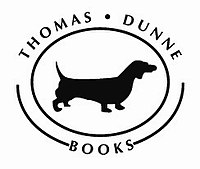Thomas Dunne Books
 |
|
| Parent company | St. Martin's Press (Macmillan Publishers) |
|---|---|
| Founded | 1986 |
| Country of origin | United States |
| Headquarters location | Flatiron Building, New York City |
| Key people | Thomas Dunne (Publisher) |
| Publication types | Books |
| Fiction genres | Contemporary, Mainstream, Mystery, Suspense |
| Revenue | $15 million (1999) |
| No. of employees | 10 |
| Official website | Thomas Dunne Books |
| division | |
| Industry | filmed entertainment |
| Founded | New York City (October 2010) |
| Headquarters | New York City |
|
Key people
|
Brendan Deneen, executive editor |
| Services | Film development |
|
Number of employees
|
2 |
| Parent | Macmillan Publishers |
| Website | us |
Thomas Dunne Books, an imprint of St. Martin's Press, a division of Macmillan Publishers, publishes popular trade fiction and nonfiction. Established by publisher Thomas Dunne in 1986, Thomas Dunne Books is based out of the Flatiron Building in New York City. "An imprint that scorns snobbery, prizes the quirky and commercial and flourishes through a unique form of high-volume publishing," Thomas Dunne Books produces approximately 175 titles each year, covering a range of genres including commercial and literary fiction, mysteries, thrillers, biography, politics, history, sports, and popular science. The imprint is the leading mysteries publisher. In its nearly 30-year history, Thomas Dunne Books has published numerous New York Times bestsellers including Dan Brown's first novel Digital Fortress, over 20 books by international sensation Rosamunde Pilcher, a series of Walking Dead novels written by series creator Robert Kirkman, A Street Cat Named Bob by James Bowden, the Meg Langslow mysteries by Donna Andrews, To Try Men's Souls and other historical fiction by former Speaker of the House Newt Gingrich and many, many more. Currently, Thomas Dunne Books publishes trade paperbacks through St. Martin's Griffin and mysteries through St. Martin's Minotaur.
The imprint signed David Irving, a scholar, for a Joseph Goebbels biography in 1996 but had to drop the book when it was found out that Irving was a Holocaust denier for having links to Institute for Historical Review, "the literary center of the United States Holocaust-denial movement."
...
Wikipedia
